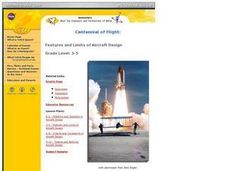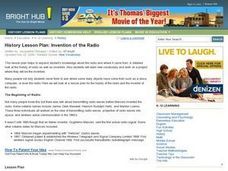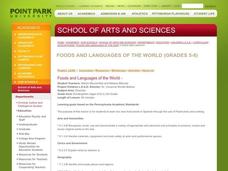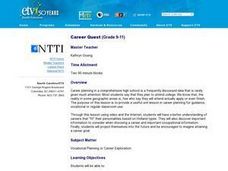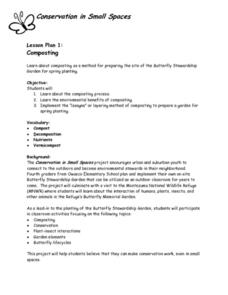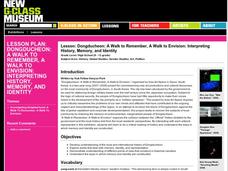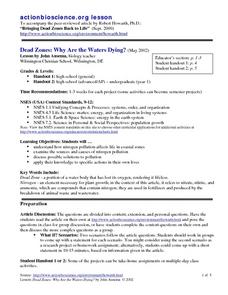Curated OER
Features and Limits of Aircraft Design
Students identify the desired features of an aircraft and the limits that they, the Wright Brothers, or NASA scientists might face in designing one, and methods to solve these. They review parts of an airplane and what makes it fly. They...
University of Colorado
Phases of Charon
Pluto, although no longer considered a planet, has five moons. Pluto's moon, Charon, is the focus of a resource that describes how the moon is viewed from the surface of Pluto. Photos help individuals see how Charon would look at...
University of Colorado
Phases of Charon
Charon, the largest of Pluto's moons, was discovered in 1978. Lesson is a walk through of how to solve for the phases of Charon. It uses two different points on Pluto and takes into account the tilt of the pole, the rotational axis, and...
Curated OER
Slavery in Colonial America
Students examine the experience of the middle passage of slaves. They review slave songs and discuss their common themes. They develop a monologue in which they integrate a fragment of an actual slave song into a poem they have written.
Curated OER
Finding Out About the Stars and Planets
Students complete a web-based activity to study the planets and solar system. Students complete a number of activities including a slide show that depict the true facts about planets.
Curated OER
Planets or Not, Here We Come!
Students, working in groups, research planets in terms of the size, temperature, number of moons, and potential for life. They use packets and worksheets as guides for their research. Students may role-play as aliens visiting their...
Curated OER
Invention of the radio
Eighth graders study the radio and where it came from. In this American History lesson, 8th graders explore the history of the radio. Students create an invention that will be useful to them today.
Curated OER
International Festival: Germany
Young scholars complete several activities to learn about the German culture. In this German culture lesson, students read the 'Hansel and Gretel' story and create a paper gingerbread house. Young scholars complete a matching game for...
Curated OER
Defining Values: Environmental Issues
Students analyze an environmental issue of local or regional interest and compare and contrast the roles of the individual and the community in responding to the issue. They discuss how values are expressed in environmental issues and...
Curated OER
Writers Workshop
Students work together to brainstorm using a software program. Individually, they decide on a topic to write about and begin their pre-writing activities. They write about their topic using the pictures they previously drew and...
Curated OER
The Chaos Game
Young scholars measure and predict the behavior of a fractal. In this investigative lesson students divide into groups, and participate in an activity that includes drawing triangles and coloring vertices.
Curated OER
Foods and Languages of the World
Students review Mexico's location and language and learn to pronouns 10 new Spanish food words. Students listen as the book, Corn is Maize is read, touching and passing around an ear of Indian corn. Students discuss the contribution of...
Curated OER
GUITARS AS SCULPTURE
Students discuss guitars, pointing out different parts of the guitar, compare/contrast guitars from different times, imagine they are designers hired to build a new age guitar, create many preliminary sketches, choose one, and begin...
Curated OER
Guess Who's Coming to Dinner?
Who would you love to see at your table? Groups research a decade, ranging from the 1840s to the 1960s, read a short story associated with that decade, and plan a dinner party, complete with table set-up and menu. After researching...
Curated OER
Escher-Esque Tessellations
Middle and high schoolers participate in a seven-part lesson creating Escher-Esque tessellations. They demonstrate their knowledge of geometric transformations after viewing a PowerPoint presentation, conducting Internet research, and...
Curated OER
Ecosystems and Remote Sensing
Students obtain remote sensing data to compare and contrast global biomass data with global temperature data.
Curated OER
Navajo Pottery: Beautiful Objects
Young potters make their very own version of the classic Navajo Pottery. With helpful worksheets and applicable cross-curricular activities, the lesson is an enriching way to mold both your clay and the multicultural acceptance of your...
Curated OER
Career Quest
Help potential job seekers create a personal job options list that "fits" their personality type. They will discover specific occupational information about two chosen careers. Then they will identify the most important factors to keep...
Safe Drinking Water Foundation
Water Pollution
An introductory lesson to a unit on water pollution, young environmentalists are asked to brainstorm examples of pollutants in water. This lesson will help develop a sense of what water pollution is and where the pollutants come from.
Curated OER
Conservation in Small Places - Composting
A fabulous instructional activity introduces the art of composting to your gardeners. In it, youngsters learn about the composting process and how it actually works. They discuss the environmental benefits of composting, and use the...
Missouri Department of Elementary
Friendship Line Dancing
Develop social awareness with a instructional activity that challenges scholars to properly communicate with their peers. Standing in two lines, participants practice introducing themselves, asking how their partner is feeling, asks if...
Curated OER
Lesson: Dongducheon: A Walk to Remember, A Walk to Envision: Interpreting History, Memory, and Identity
Cultural discourse can start through a variety of venues. Learners begin to think about how our minds, memories, and identities shape our attitudes toward culture and history. They analyze seven pieces from the Dongducheon art exhibit...
Curated OER
The Elements of Art Through Photography
Fifth graders photograph examples of the five elements of art: line, shape, color, pattern, and composition.
Curated OER
Dead Zones: Why Are the Waters Dying?
Students investigate the effects of pollution on marine ecosystems. They read and discuss an article, identify the effects of pollution on marine life, conduct research on local nutrient pollution, and conduct local water quality studies.


